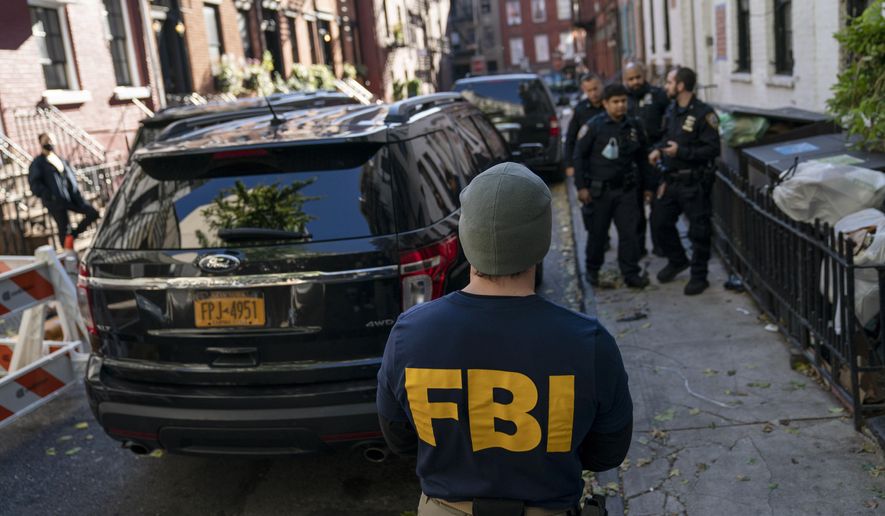FBI agents violated agency rules at least 747 times in 18 months while conducting investigations involving politicians, candidates, religious groups, news media and others, according to a 2019 FBI audit obtained by The Washington Times.
The internal review revealed a ratio of slightly more than two “compliance errors” per sensitive investigative matter reviewed by FBI auditors. These errors included agents’ failure to obtain approval from senior FBI officials to start an investigation, failure to document a necessary legal review before opening an investigation and failure to tell prosecutors what they were doing.
Cato Institute senior fellow Patrick Eddington uncovered the audit in litigation his organization brought against the FBI for access to government records. He said the audit reveals how far “off-the-chain” FBI field offices have strayed.
“When they open investigations without authorization, to me, that’s about as radical as it gets,” Mr. Eddington said.
The FBI auditors reviewed a small portion of the bureau’s portfolio. They studied 353 cases involving sensitive investigative matters — less than half of the total number of such cases — and found rules broken 747 times from Jan. 1, 2018, to June 30, 2019.
Sensitive investigative matters are actions that may impact constitutional rights because they involve people engaged in such things as politics, governance, religious expression and news reporting.
A majority of the cases studied, 191, involved domestic public officials. Dozens of cases involved religious organizations or their prominent members, and dozens of cases involved domestic political organizations and individuals. Ten cases involved domestic political candidates, and 11 cases involved news media.
The audit doesn’t reveal the identities of the people and groups investigated by the FBI.
FBI investigations have come under intense scrutiny after reports of cutting corners in recent years, particularly stemming from its Crossfire Hurricane investigation into Trump-Russia collusion in the 2016 presidential election.
Former FBI lawyer Kevin Clinesmith pleaded guilty in 2020 to falsifying information to justify surveillance of a former Trump campaign adviser and was sentenced to one year of probation.
Mr. Clinesmith’s offense predated the period examined in the 2019 FBI audit.
The 2019 FBI audit said 70% of the 747 compliance errors were “related to approvals, notifications, and administrative matters.” For example, 35 full investigations and four preliminary investigations did not have the approval of an FBI special agent in charge.
Mr. Eddington said a portion of the violations could be construed as housekeeping and bookkeeping issues, but he believes a lot of them go way beyond individual sloppiness.
The audit redacts recommendations to correct the compliance errors.
The FBI said it does not comment on matters involving pending litigation and refused to answer questions from The Washington Times.
Federal lawmakers also are searching for answers about the FBI’s work. House Oversight and Reform Committee lawmakers last week requested another review of the FBI’s conduct in domestic operations.
Reps. Jamie Raskin, Maryland Democrat, and Nancy Mace, South Carolina Republican, wrote a letter to the Government Accountability Office requesting a review of the FBI’s practice of surveilling people through assessments.
They said they had concerns that such assessments resulted in the “improper monitoring of protected First Amendment activity” and wanted to know whether the FBI had controls to prevent violations of constitutional protections.
Other lawmakers have tried, with little success, to get information about the FBI’s domestic operations. In December, the FBI told Sen. Chuck Grassley, Iowa Republican, that it did not need to explain its 2016 probe of the conservative group Concerned Women for America and declined to answer questions about the bureau’s reasoning. The FBI revealed last year, after conducting an assessment, that there was nothing to pursue at Concerned Women for America.
The 2019 FBI audit does not state how many of the sensitive investigative matters lead to prosecutions or convictions.
In and around the timespan of the audit, the Justice Department and FBI repeatedly came under scrutiny for questionable investigations involving lawmakers and news reporters.
Department of Justice investigations into leaks of classified information resulted in the seizure of records of at least a dozen people connected to the House Permanent Select Committee on Intelligence in 2017 and early 2018. Prosecutors reportedly gathered information on lawmakers, aides and family members.
CNN said in May that the Justice Department informed its Pentagon correspondent, Barbara Starr, that prosecutors had obtained her phone and email records covering two months in the summer of 2017.
Attorney General Merrick Garland issued a policy in July that “restricts the use of compulsory process” to obtain information from reporters gathering news.
• Ryan Lovelace can be reached at rlovelace@washingtontimes.com.




Please read our comment policy before commenting.